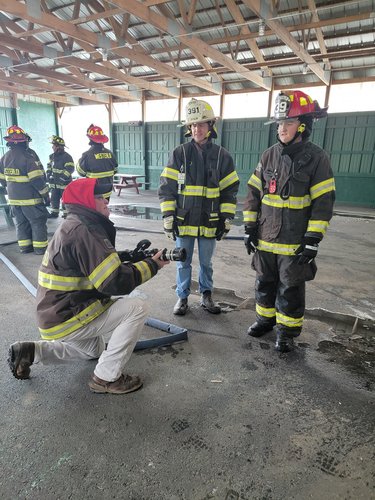Spending up, taxes variable in tentative Hilltown budgets
—Photo from Westerlo Volunteer Fire Company Facebook
Fire district tax levies have gone up in Knox, Westerlo, and Rensselaerville, according to each town’s tentative 2025 budget. Medusa Volunteer Fire Company President Tabatha Case told The Enterprise last week that expenses for departments have gone up across the board, using rising equipment costs as an example.
HILLTOWNS — Although both Westerlo and Knox are seeing an increase in spending in their tentative 2025 budgets, only Westerlo projects a townwide tax increase, with an overall increase to the levy of about 2 percent, including special districts.
Knox has townwide taxes steady, but does see an increase to the levy from its two fire districts. The Berne Fire District levy is up 15 percent, while the Knox Fire District levy is up about 2 percent.
Fire district levies have gone up in Westerlo and Rensselaerville as well, likely due to increases in equipment costs, as Medusa Volunteer Fire Company President Tabatha Case explained to The Enterprise last week. Berne’s fire budget also shows that over $3,000 is owed in unpaid taxes from Knox’s share, which accounts for more than 50 percent of the increase for 2025.
Tentative budgets are the first draft submitted to town boards as part of the municipal budget process and all figures are subject to change before each board adopts its final budget in November.
Knox overview
Knox’s $3.1 million tentative 2025 budget is up about five percent, including special districts, which are self-funded. Total revenue is up nearly 17 percent, much of it attributed to a 15-percent larger projection for sales tax from Albany County, which is expected to contribute $1.2 million toward the 2025 budget across both the highway and general funds.
The county redistributes a portion of the sales tax it collects to towns based on population.
The cost for ambulance service in Knox is up 5 percent in the tentative budget, from just under $136,000 this year to a little more than $143,000 next year.
Knox was, until the beginning of this year, served in part by the Altamont Rescue Squad, which has stopped providing that service. Knox then expanded its contract with neighboring Guilderland’s ambulance service to make up for the loss of Altamont’s service at the same rate the village squad had offered the town.
The remainder of Knox is covered by the ambulance service in Berne, Helderberg Ambulance, still staffed largely by volunteers. Knox never had its own rescue squad.
The town’s debt service has gone up slightly, as Knox has finished off paying its $80,000-per-year bond on the town hall, but has taken on a new $800,000 bond to rebuild its transfer station, the first installment of which will be $90,000, according to the tentative budget. Interest will be $2,020, up from $1,408 on the town hall bond.
Most town employees and officials have also received small raises.
Westerlo
Westerlo’s $3.8 million tentative budget is up 7 percent, including special districts, while revenue is up 12 percent at a little over $2 million. As in Knox, Westerlo is expecting a higher sales-tax distribution next year, up 7.8 percent compared to what was projected for this year, contributing $1.5 million overall.
Ambulance service, provided by the Albany County Sheriff’s Office, is up 4.3 percent — much less than the nearly 30-percent jump the town weathered in 2024.
The Enterprise reported recently on the slow progress made by Westerlo and a number of other towns in the county that rely on the sheriff’s ambulance service to try and move those expenses over to the county budget so that any tax increases for residents are calculated against the county’s much larger budget.
The budget also reflects the controversial change Westerlo made to its government by abolishing its planning board — whose five members together were authorized to earn up to $15,800 total this year — and having the zoning board take over its functions.
The zoning board members saw a slight increase in compensation. The total compensation allocated to its four regular members has gone from $9,600 to $9,984, while the chairman’s salary has gone from $4,200 to $4,368, and the board clerk’s salary has gone from $2,000 to $4,080.
This suggests that next year the town will be saving $13,822 from the abolishment.
The town has also added $30,000 in attorney fees, which Supervisor Matt Kryzak told The Enterprise this week are for “additional legal services” to handle the Albany Water Board assessment challenge, a lawsuit filed by former planning board members seeking to undo that board’s abolishment, and a labor-relations firm that will be handling union negotiations for town employees.



